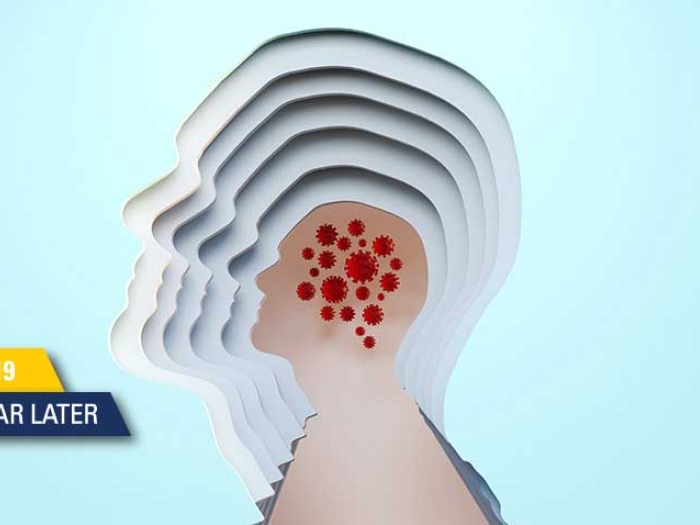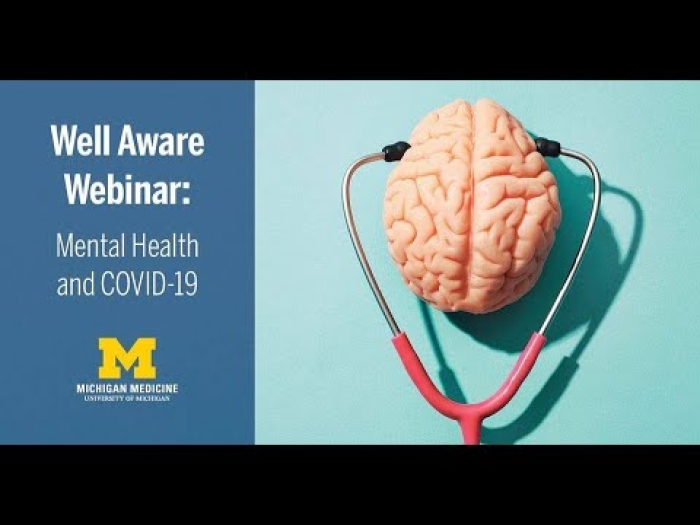Music therapists provide six ways that music can help you deal with stress and anxiety.
5:05 PM
Author |

Editor's note: Information on the COVID-19 crisis is constantly changing. For the latest numbers and updates, keep checking the CDC's website. For the most up-to-date information from Michigan Medicine, visit the hospital's Coronavirus (COVID-19) webpage.
Music therapy is used for all types of patients and people. Songs allow you, and those around you, help to calm your nervous system, relax and heal your soul.
Music therapy is the clinical and evidence-based use of music interventions to accomplish individualized goals within a therapeutic relationship. The U-M Rogel Cancer Center has two certified music therapists: Bob Huffman and Peter Carpenter.
Huffman, who has been a music therapist at Michigan Medicine for over 15 years, feels that whether he's working directly with a patient or in a larger setting with caregivers, family members or staff, music is healing.
"I often position my guitar so that the sound is projecting all over them, covering them with sound. I feel there is a healing through vibration happening, even though that's a whole separate field," said Huffman.
It brings up memories. It takes us back to places and times that we remember fondly. And it's healing in that way. Music has a way to let us express our feelings and emotions where sometimes words fall short.Bob Huffman
SEE ALSO: "Music for the Soul" episode on the 3Ps of Cancer Podcast
While it might not be a physical treatment, it brings comfort to those in distress. Huffman says the benefit from music is due to its enormous presence in our lives.
"It brings up memories. It takes us back to places and times that we remember fondly. And it's healing in that way. Music has a way to let us express our feelings and emotions where sometimes words fall short," he explains.
MORE FROM MICHIGAN: Sign up for our weekly newsletter
"I can't tell you how many times I've been in intensive care rooms with family members, as well as the patient, and I'll be playing and all of a sudden I'll see tears start pouring down the faces of family members. I know that it's the music that's allowed them to express those intense feelings at this time where words may have been awkward."
SEE ALSO: Beautiful Music: Entertainment and emotions combine into therapy for cancer patients
Peter Carpenter, who's been with the Rogel Cancer Center for the last four years, says these followings tips can help you to use music to improve your health:
-
Listen with a purpose. When you're anxious or worried, use music to redirect those thoughts and feelings.
-
Match your mood. When you notice your mood is low, listen to music that first matches how you feel. Next, pick songs that change your mood over time.
-
Start a music journal. Journaling is a process that collects thoughts and feelings. By writing down those feelings, you can improve focus on the now rather than worry or pain.
-
Listen to something new. Listening to new music can activate your mind in a productive and interesting way. You could even try to find new things in familiar songs. Did you notice something about the words or the background singers? Really try to make every song new again to you.
-
Try something new. Pull out that guitar or ukulele from under your bed and learn a new skill. Trying something new can energize and motivate you.
-
Talk to a music therapist. Music therapists are there to support you as experts on how to use music to accomplish any of your goals.
And although working with a music therapist has many benefits, both Carpenter and Huffman say all you really need to do is listen. Here, U-M Rogel Cancer Center music therapist Peter Carpenter sings the Bruno Mars hit "Count On Me" to help ease those feeling stress and anxiety.
Like Podcasts? Add the Michigan Medicine News Break on iTunes or anywhere you listen to podcasts.

Explore a variety of healthcare news & stories by visiting the Health Lab home page for more articles.

Department of Communication at Michigan Medicine
Want top health & research news weekly? Sign up for Health Lab’s newsletters today!





